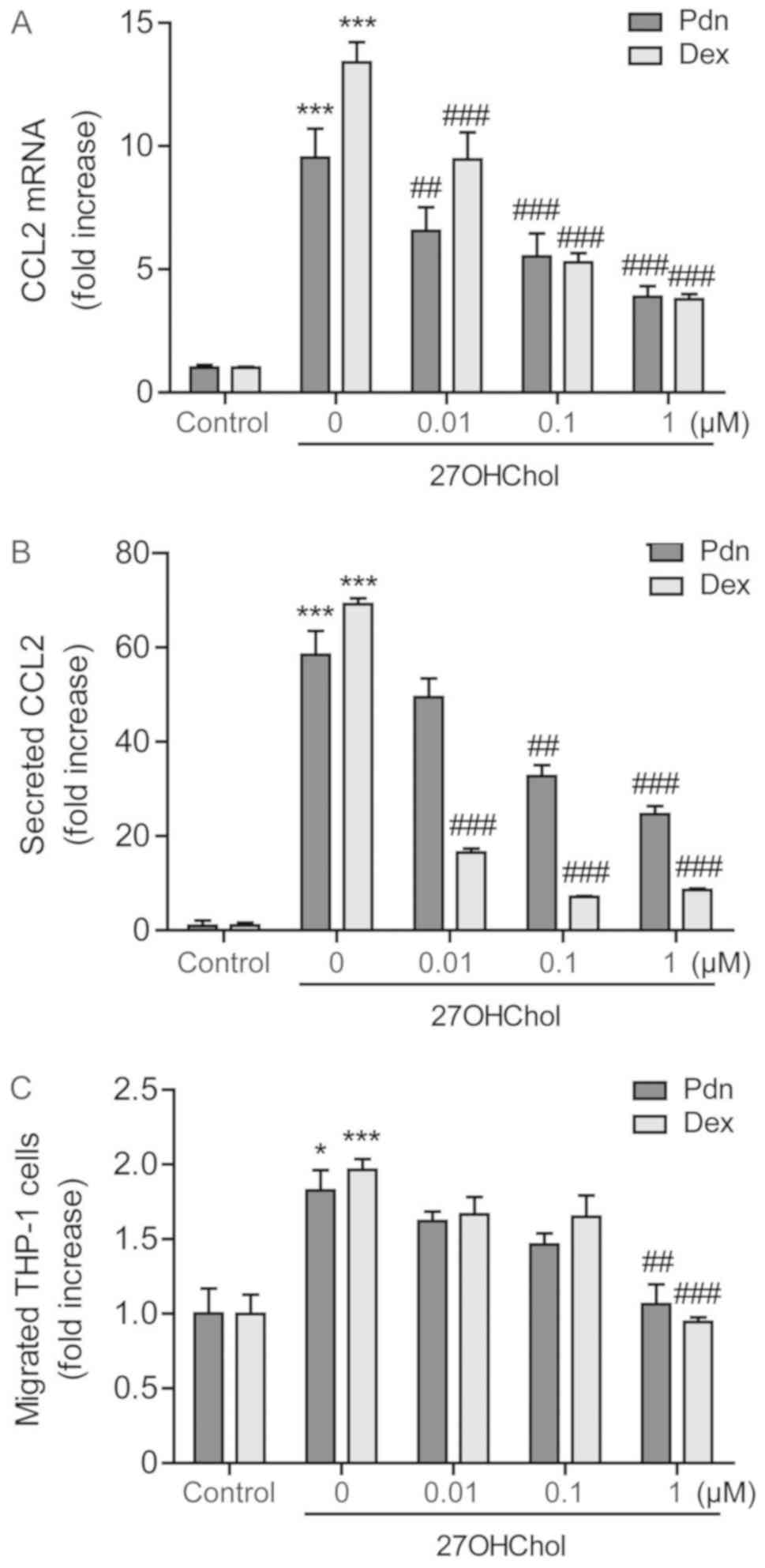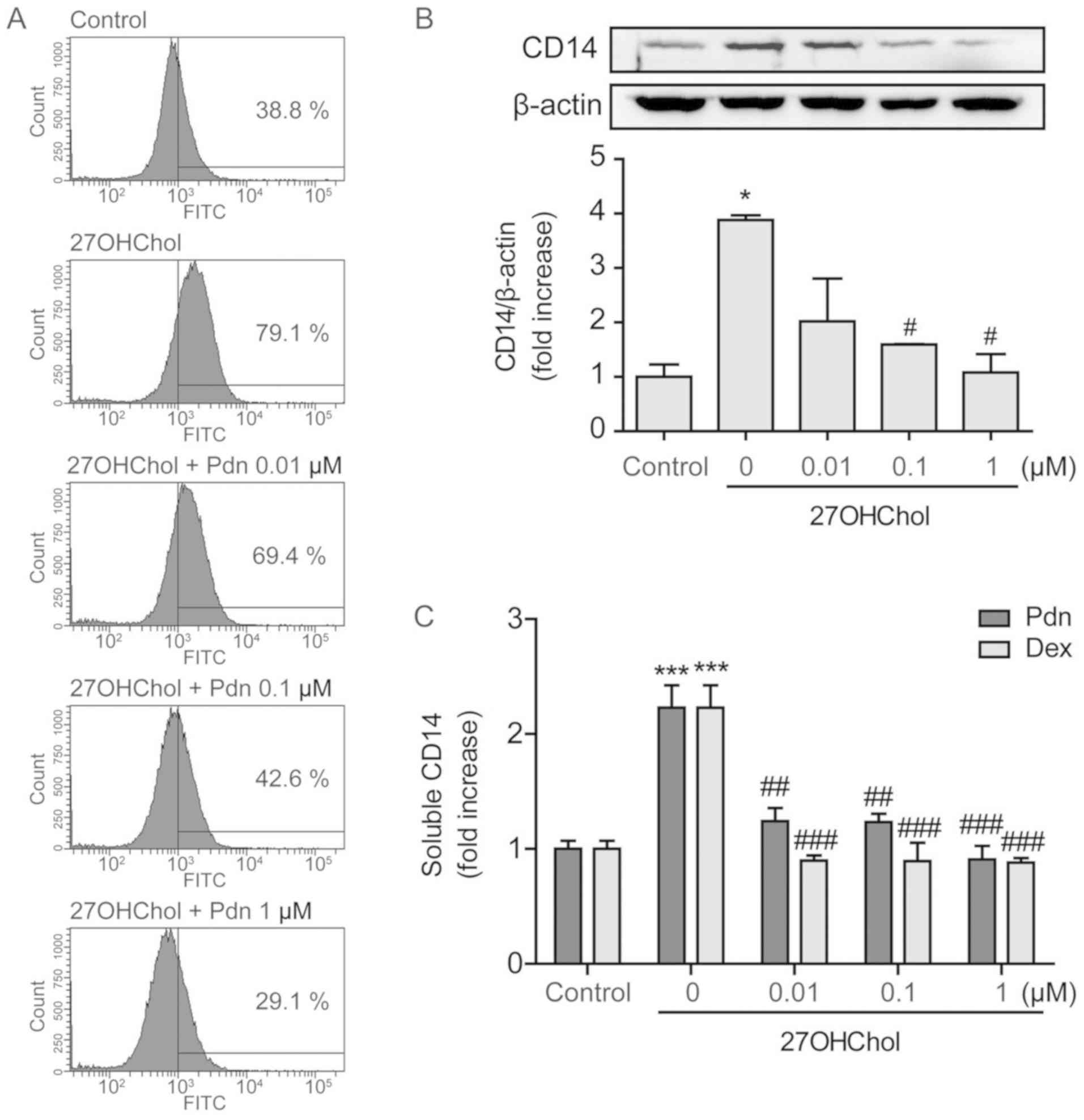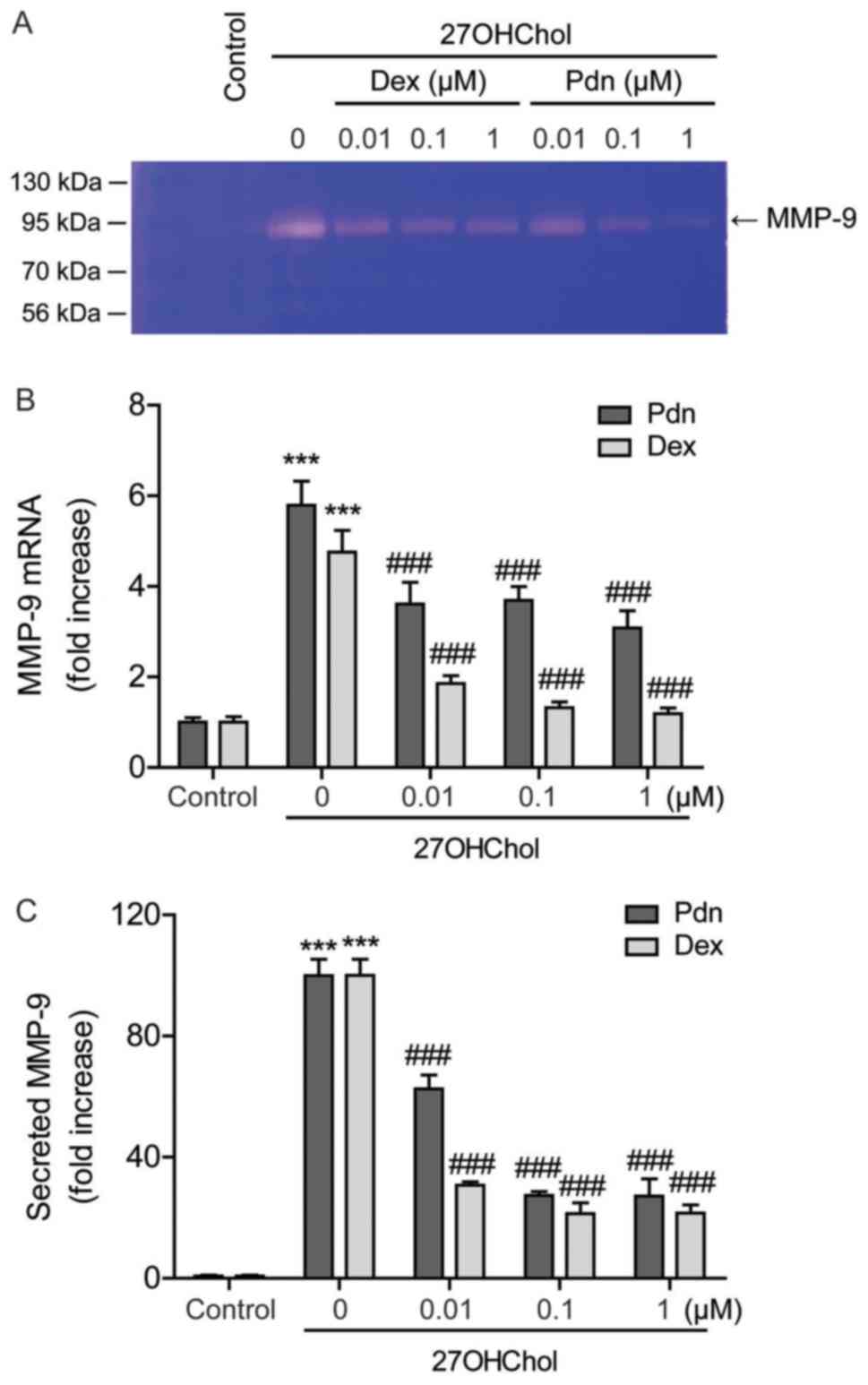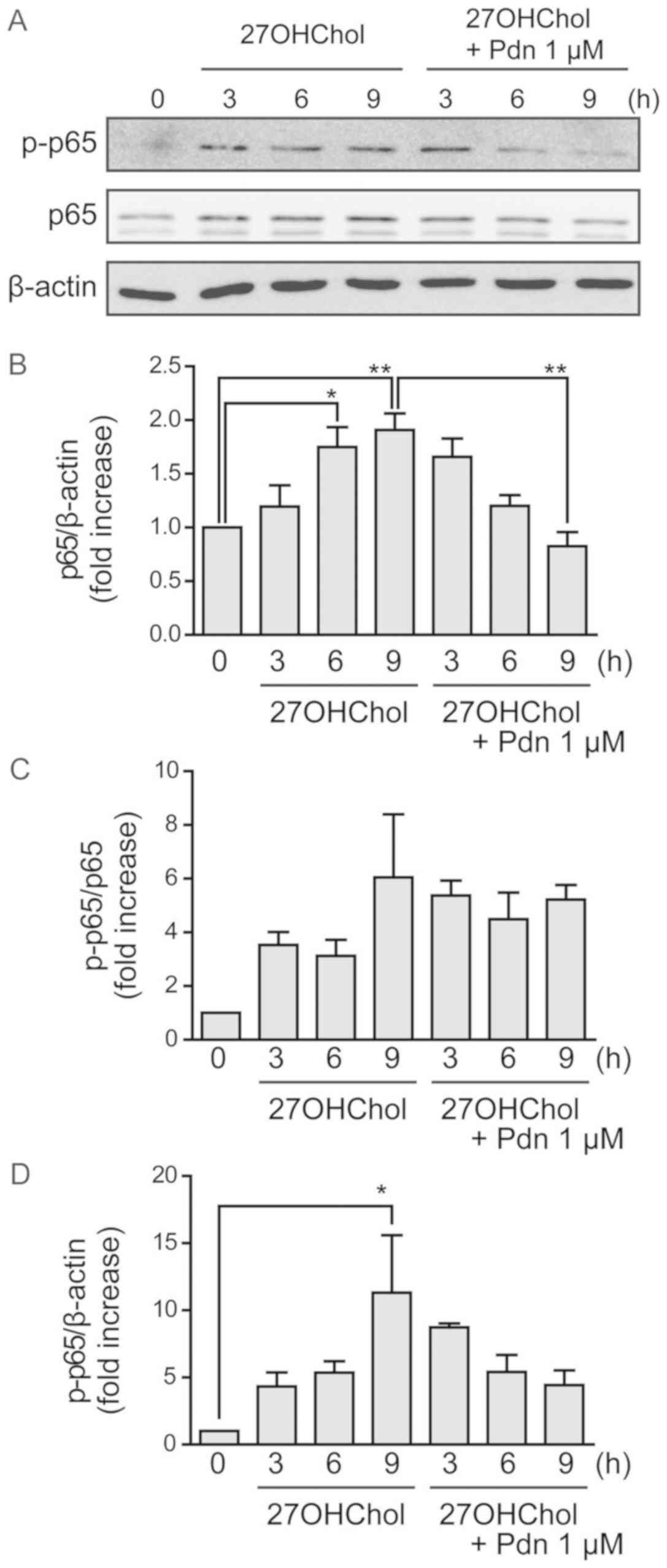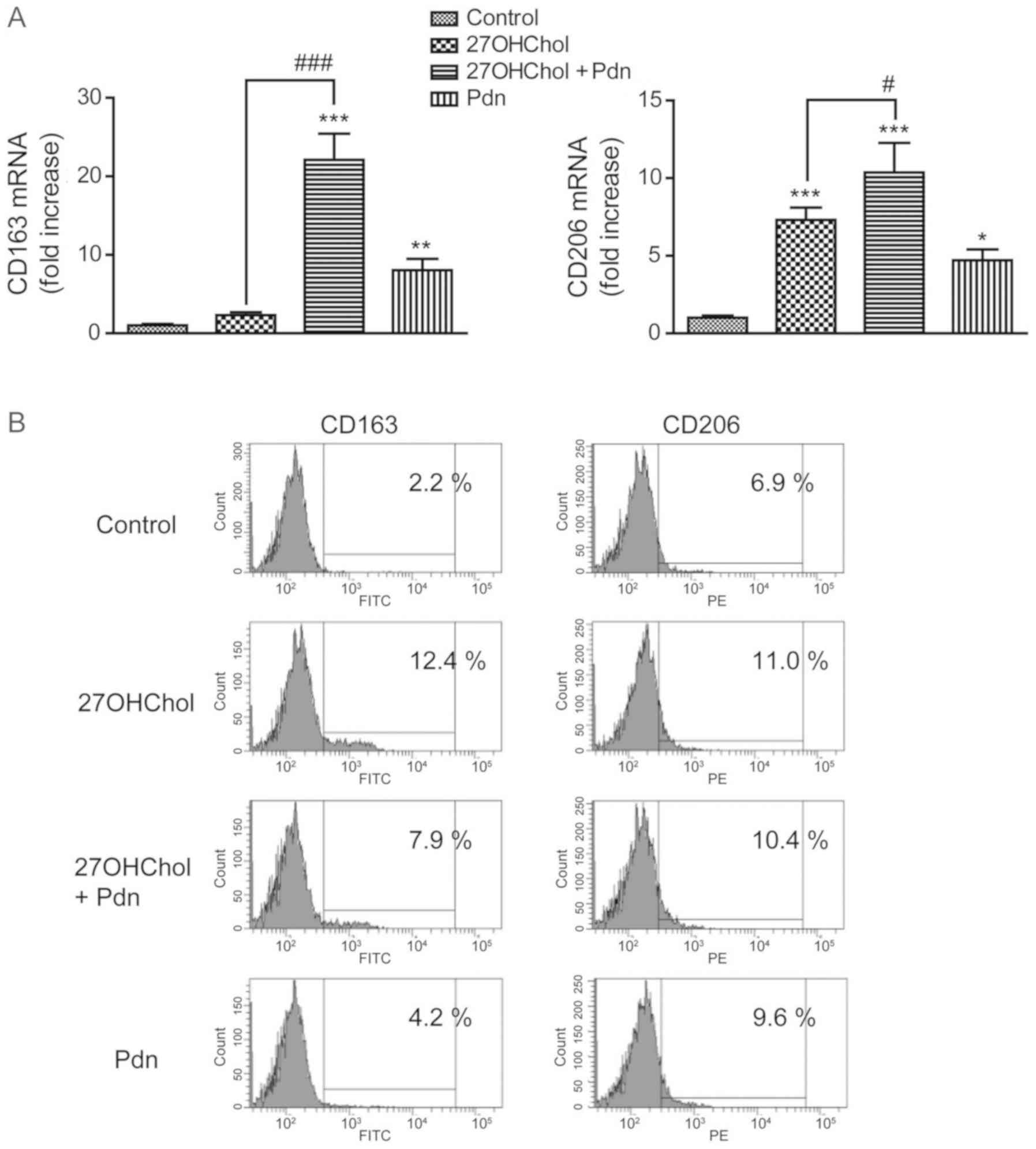|
1
|
Czock D, Keller F, Rasche FM and Häussler
U: Pharmacokinetics and pharmacodynamics of systemically
administered glucocorticoids. Clin Pharmacokinet. 44:61–98. 2005.
View Article : Google Scholar : PubMed/NCBI
|
|
2
|
Blotta MH, DeKruyff RH and Umetsu DT:
Corticosteroids inhibit IL-12 production in human monocytes and
enhance their capacity to induce IL-4 synthesis in CD4+
lymphocytes. J Immunol. 158:5589–5595. 1997.PubMed/NCBI
|
|
3
|
Chung KF and Adcock IM: Signalling and
transcriptional regulation in inflammatory and immune cells:
Importance in lung biology and disease. Eur Respir J. 26:762–763.
2005. View Article : Google Scholar : PubMed/NCBI
|
|
4
|
Parrillo JE and Fauci AS: Mechanisms of
glucocorticoid action on immune processes. Annu Rev Pharmacol
Toxicol. 19:179–201. 1979. View Article : Google Scholar : PubMed/NCBI
|
|
5
|
Bailey JM and Butler J: Anti-inflammatory
drugs in experimental atherosclerosis. I. Relative potencies for
inhibiting plaque formation. Atherosclerosis. 17:515–522. 1973.
View Article : Google Scholar : PubMed/NCBI
|
|
6
|
Joner M, Morimoto K, Kasukawa H,
Steigerwald K, Merl S, Nakazawa G, John MC, Finn AV, Acampado E,
Kolodgie FD, et al: Site-specific targeting of nanoparticle
prednisolone reduces in-stent restenosis in a rabbit model of
established atheroma. Arterioscler Thromb Vasc Biol. 28:1960–1966.
2008. View Article : Google Scholar : PubMed/NCBI
|
|
7
|
Lemaire-Ewing S, Prunet C, Montange T,
Vejux A, Berthier A, Bessède G, Corcos L, Gambert P, Néel D and
Lizard G: Comparison of the cytotoxic, pro-oxidant and
pro-inflammatory characteristics of different oxysterols. Cell Biol
Toxicol. 21:97–114. 2005. View Article : Google Scholar : PubMed/NCBI
|
|
8
|
van Reyk DM, Brown AJ, Hult'en LM, Dean RT
and Jessup W: Oxysterols in biological systems: Sources, metabolism
and pathophysiological relevance. Redox Rep. 11:255–262. 2006.
View Article : Google Scholar : PubMed/NCBI
|
|
9
|
Vejux A and Lizard G: Cytotoxic effects of
oxysterols associated with human diseases: Induction of cell death
(apoptosis and/or oncosis), oxidative and inflammatory activities,
and phospholipidosis. Mol Aspects Med. 30:153–170. 2009. View Article : Google Scholar : PubMed/NCBI
|
|
10
|
Carpenter KL, Taylor SE, Ballantine JA,
Fussell B, Halliwell B and Mitchinson MJ: Lipids and oxidised
lipids in human atheroma and normal aorta. Biochim Biophys Acta.
1167:121–130. 1993. View Article : Google Scholar : PubMed/NCBI
|
|
11
|
Kim SM, Kim BY, Lee SA, Eo SK, Yun Y, Kim
CD and Kim K: 27-Hydroxycholesterol and 7alpha-hydroxycholesterol
trigger a sequence of events leading to migration of
CCR5-expressing Th1 lymphocytes. Toxicol Appl Pharmacol.
274:462–470. 2014. View Article : Google Scholar : PubMed/NCBI
|
|
12
|
Kim SM, Lee SA, Kim BY, Bae SS, Eo SK and
Kim K: 27-Hydroxycholesterol induces recruitment of monocytic cells
by enhancing CCL2 production. Biochem Biophys Res Commun.
442:159–164. 2013. View Article : Google Scholar : PubMed/NCBI
|
|
13
|
Jurisic V, Terzic T, Colic S and Jurisic
M: The concentration of TNF-alpha correlate with number of
inflammatory cells and degree of vascularization in radicular
cysts. Oral Dis. 14:600–605. 2008. View Article : Google Scholar : PubMed/NCBI
|
|
14
|
Kim SM, Jang H, Son Y, Lee SA, Bae SS,
Park YC, Eo SK and Kim K: 27-Hydroxycholesterol induces production
of tumor necrosis factor-alpha from macrophages. Biochem Biophys
Res Commun. 430:454–459. 2013. View Article : Google Scholar : PubMed/NCBI
|
|
15
|
Kim SM, Lee CW, Kim BY, Jung YS, Eo SK,
Park YC and Kim K: 27-Oxygenated cholesterol induces expression of
CXCL8 in macrophages via NF-kappaB and CD88. Biochem Biophys Res
Commun. 463:1152–1158. 2015. View Article : Google Scholar : PubMed/NCBI
|
|
16
|
Heo W, Kim SM, Eo SK, Rhim BY and Kim K:
FSL-1, a toll-like receptor 2/6 agonist, induces expression of
interleukin-1α in the presence of 27-hydroxycholesterol. Korean J
Physiol Pharmacol. 18:475–480. 2014. View Article : Google Scholar : PubMed/NCBI
|
|
17
|
Kim SM, Kim BY, Eo SK, Kim CD and Kim K:
27-Hydroxycholesterol up-regulates CD14 and predisposes monocytic
cells to superproduction of CCL2 in response to lipopolysaccharide.
Biochim Biophys Acta. 1852:442–450. 2015. View Article : Google Scholar : PubMed/NCBI
|
|
18
|
Son Y, Kim SM, Lee SA, Eo SK and Kim K:
Oxysterols induce transition of monocytic cells to phenotypically
mature dendritic cell-like cells. Biochem Biophys Res Commun.
438:161–168. 2013. View Article : Google Scholar : PubMed/NCBI
|
|
19
|
Murray PJ and Wynn TA: Protective and
pathogenic functions of macrophage subsets. Nat Rev Immunol.
11:723–737. 2011. View
Article : Google Scholar : PubMed/NCBI
|
|
20
|
Colvin EK: Tumor-associated macrophages
contribute to tumor progression in ovarian cancer. Front Oncol.
4:1372014. View Article : Google Scholar : PubMed/NCBI
|
|
21
|
Takeuchi H, Tanaka M, Tanaka A, Tsunemi A
and Yamamoto H: Predominance of M2-polarized macrophages in bladder
cancer affects angiogenesis, tumor grade and invasiveness. Oncol
Lett. 11:3403–3408. 2016. View Article : Google Scholar : PubMed/NCBI
|
|
22
|
Son Y, Kim BY, Eo SK, Park YC and Kim K:
Dexamethasone suppresses oxysterol-induced differentiation of
monocytic cells. Oxid Med Cell Longev. 2016:29153822016. View Article : Google Scholar : PubMed/NCBI
|
|
23
|
Sparrow A and Geelhoed G: Prednisolone
versus dexamethasone in croup: A randomised equivalence trial. Arch
Dis Child. 91:580–583. 2006. View Article : Google Scholar : PubMed/NCBI
|
|
24
|
Lee J, Kim BY, Son Y, Giang DH, Lee D, Eo
SK and Kim K: 4′-O-Methylalpinumisoflavone inhibits the activation
of monocytes/macrophages to an immunostimulatory phenotype induced
by 27-hydroxycholesterol. Int J Mol Med. 43:2177–2186.
2019.PubMed/NCBI
|
|
25
|
Livak KJ and Schmittgen TD: Analysis of
relative gene expression data using real-time quantitative PCR and
the 2(-Delta Delta C(T)) method. Methods. 25:402–408. 2001.
View Article : Google Scholar : PubMed/NCBI
|
|
26
|
Radenkovic S, Konjevic G, Jurisic V,
Karadzic K, Nikitovic M and Gopcevic K: Values of MMP-2 and MMP-9
in tumor tissue of basal-like breast cancer patients. Cell Biochem
Biophys. 68:143–152. 2014. View Article : Google Scholar : PubMed/NCBI
|
|
27
|
Marengo B, Bellora F, Ricciarelli R, De
Ciucis C, Furfaro A, Leardi R, Colla R, Pacini D, Traverso N,
Moretta A, et al: Oxysterol mixture and, in particular,
27-hydroxycholesterol drive M2 polarization of human macrophages.
Biofactors. 42:80–92. 2016.PubMed/NCBI
|
|
28
|
Umetani M, Ghosh P, Ishikawa T, Umetani J,
Ahmed M, Mineo C and Shaul PW: The cholesterol metabolite
27-hydroxycholesterol promotes atherosclerosis via proinflammatory
processes mediated by estrogen receptor alpha. Cell Metab.
20:172–182. 2014. View Article : Google Scholar : PubMed/NCBI
|
|
29
|
Bertani FR, Mozetic P, Fioramonti M,
Iuliani M, Ribelli G, Pantano F, Santini D, Tonini G, Trombetta M,
Businaro L, et al: Classification of M1/M2-polarized human
macrophages by label-free hyperspectral reflectance confocal
microscopy and multivariate analysis. Sci Rep. 7:89652017.
View Article : Google Scholar : PubMed/NCBI
|
|
30
|
Fu X, Menke JG, Chen Y, Zhou G, MacNaul
KL, Wright SD, Sparrow CP and Lund EG: 27-hydroxycholesterol is an
endogenous ligand for liver X receptor in cholesterol-loaded cells.
J Biol Chem. 276:38378–38387. 2001. View Article : Google Scholar : PubMed/NCBI
|
|
31
|
Schulman IG: Liver X receptors link lipid
metabolism and inflammation. FEBS Lett. 591:2978–2991. 2017.
View Article : Google Scholar : PubMed/NCBI
|
|
32
|
Paulus P, Holfeld J, Urbschat A, Mutlak H,
Ockelmann PA, Tacke S, Zacharowski K, Reissig C, Stay D and
Scheller B: Prednisolone as preservation additive prevents from
ischemia reperfusion injury in a rat model of orthotopic lung
transplantation. PLoS One. 8:e732982013. View Article : Google Scholar : PubMed/NCBI
|
|
33
|
Ito C, Evans WE, McNinch L, Coustan-Smith
E, Mahmoud H, Pui CH and Campana D: Comparative cytotoxicity of
dexamethasone and prednisolone in childhood acute lymphoblastic
leukemia. J Clin Oncol. 14:2370–2376. 1996. View Article : Google Scholar : PubMed/NCBI
|
|
34
|
Tak PP and Firestein GS: NF-kappaB: A key
role in inflammatory diseases. J Clin Invest. 107:7–11. 2001.
View Article : Google Scholar : PubMed/NCBI
|
|
35
|
Mantovani A, Sica A, Sozzani S, Allavena
P, Vecchi A and Locati M: The chemokine system in diverse forms of
macrophage activation and polarization. Trends Immunol. 25:677–686.
2004. View Article : Google Scholar : PubMed/NCBI
|
|
36
|
Kawai T and Akira S: Signaling to
NF-kappaB by Toll-like receptors. Trends Mol Med. 13:460–469. 2007.
View Article : Google Scholar : PubMed/NCBI
|
|
37
|
Hanania R, Sun HS, Xu K, Pustylnik S,
Jeganathan S and Harrison RE: Classically activated macrophages use
stable microtubules for matrix metalloproteinase-9 (MMP-9)
secretion. J Biol Chem. 287:8468–8483. 2012. View Article : Google Scholar : PubMed/NCBI
|
|
38
|
Deshmane SL, Kremlev S, Amini S and Sawaya
BE: Monocyte chemoattractant protein-1 (MCP-1): An overview. J
Interferon Cytokine Res. 29:313–326. 2009. View Article : Google Scholar : PubMed/NCBI
|
|
39
|
Wong C, Bezhaeva T, Rothuizen TC,
Metselaar JM, de Vries MR, Verbeek FP, Vahrmeijer AL, Wezel A, van
Zonneveld AJ, Rabelink TJ, et al: Liposomal prednisolone inhibits
vascular inflammation and enhances venous outward remodeling in a
murine arteriovenous fistula model. Sci Rep. 6:304392016.
View Article : Google Scholar : PubMed/NCBI
|
|
40
|
Senft AP, Korfhagen TR, Whitsett JA,
Shapiro SD and LeVine AM: Surfactant protein-D regulates soluble
CD14 through matrix metalloproteinase-12. J Immunol. 174:4953–4959.
2005. View Article : Google Scholar : PubMed/NCBI
|
|
41
|
Kielian TL and Blecha F: CD14 and other
recognition molecules for lipopolysaccharide: A review.
Immunopharmacology. 29:187–205. 1995. View Article : Google Scholar : PubMed/NCBI
|
















